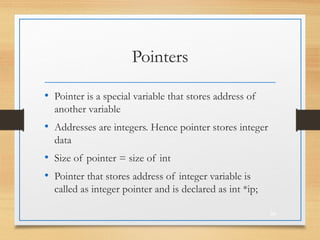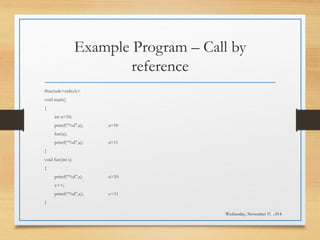C programming
- 1. C Language Wednesday, November 19, 2014 H1arshit
- 2. Overview of C • C is developed by Dennis Ritchie • C is a structured programming language • C supports functions that enables easy maintainability of code, by breaking large file into smaller modules • Comments in C provides easy readability • C is a powerful language 2
- 3. Program structure A sample C Program #include<stdio.h> int main() { --other statements // Comments after double slash } 3
- 4. C Character set • C uses • Uppercase letters A to Z • Lowercase letters a to z • Digits: 0 to 9 • Special Characters: • + - ! # % ^ & * ? <>;.’|?/” • Special combination • b- backspace • n- New Line • t- horizontal tab • a- print with alert Wednesday, November 19, 24014
- 5. Header files • The files that are specified in the include section is called as header file • These are precompiled files that has some functions defined in them • We can call those functions in our program by supplying parameters • Header file is given an extension .h • C Source file is given an extension .c ` 5
- 6. Identifiers • Identifiers are the name given to various elements such as variables, functions and array. • Both upper and lower case letters are permitted • May begin with _ (underscore) • Diff b/w - and _ Wednesday, November 19, 26014
- 7. Main function • This is the entry point of a program • When a file is executed, the start point is the main function • From main function the flow goes as per the programmers choice. • There may or may not be other functions written by user in a program • Main function is compulsory for any c program 7
- 8. Writing the first program #include<stdio.h> int main() { printf(“Hello”); return 0; } • This program prints Hello on the screen when we execute it 8
- 9. Running a C Program • Type a program • Save it • Compile the program – This will generate an exe file (executable) • Run the program (Actually the exe created out of compilation will run and not the .c file) • In different compiler we have different option for compiling and running. We give only the concepts. 9
- 10. Comments in C • Single line comment • // (double slash) • Termination of comment is by pressing enter key • Multi line comment /*…. …….*/ This can span over to multiple lines ` 10
- 11. Data types in C • Primitive data types • int, float, double, char • Aggregate data types • Arrays come under this category • Arrays can contain collection of int or float or char or double data • User defined data types • Structures and enum fall under this category. 11
- 12. Variables • Variables are data that will keep on changing • Declaration <<Data type>> <<variable name>>; int a; • Definition <<varname>>=<<value>>; a=10; • Usage <<varname>> a=a+1; //increments the value of a by 1 12
- 13. Variable names- Rules • Should not be a reserved word like int etc.. • Should start with a letter or an underscore(_) • Can contain letters, numbers or underscore. • No other special characters are allowed including space • Variable names are case sensitive • A and a are different. 13
- 14. Keywords • In C there are certain reserved word that we cannot declare as variable. • These word is known as keyword • Keywords are reserved words that have a special meaning in a programming language. Wednesday, November 19,1 24014
- 15. Keywords • auto • double •• break int •struct • else •long •switch • case • enum •register •typedef • char • extern •return •union • const • float •short •unsigned • continue • for •signed •void • • default goto •sizeof •volatile • if •static •• do while 15
- 16. Input and Output • Input • scanf(“%d”,&a); • Gets an integer value from the user and stores it under the name “a” • Output • printf(“%d”,a); • Prints the value present in variable a on the screen 16
- 17. For loops • The syntax of for loop is for(initialisation;condition checking;increment) { set of statements } Eg: Program to print Hello 10 times for(I=0;I<10;I++) { printf(“Hello”); } 17
- 18. While loop • The syntax for while loop while(condn) { statements; } Eg: a=10; while(a != 0) Output: 10987654321 { printf(“%d”,a); a--; } 18
- 19. Do While loop • The syntax of do while loop do { set of statements }while(condn); Eg: i=10; Output: do 10987654321 { printf(“%d”,i); i--; }while(i!=0) 19
- 20. Conditional statements if (condition) { stmt 1; //Executes if Condition is true } else { stmt 2; //Executes if condition is false } 20
- 21. Conditional statement switch(var) { case 1: //if var=1 this case executes stmt; break; case 2: //if var=2 this case executes stmt; break; default: //if var is something else this will execute stmt; } 21
- 22. Operators • Arithmetic (+,-,*,/,%) • Relational (<,>,<=,>=,==,!=) • Logical (&&,||,!) • Bitwise (&,|) • Assignment (=) • Compound assignment(+=,*=,-=,/=,%=,&=,|=) • Shift (right shift >>, left shift <<) 22
- 23. String functions • strlen(str) – To find length of string str • strrev(str) – Reverses the string str as rts • strcat(str1,str2) – Appends str2 to str1 and returns str1 • strcpy(st1,st2) – copies the content of st2 to st1 • strcmp(s1,s2) – Compares the two string s1 and s2 • strcmpi(s1,s2) – Case insensitive comparison of strings 23
- 24. Numeric functions • pow(n,x) – evaluates n^x • ceil(1.3) – Returns 2 • floor(1.3) – Returns 1 • abs(num) – Returns absolute value • log(x) - Logarithmic value • sin(x) • cos(x) • tan(x) 24
- 25. Procedures • Procedure is a function whose return type is void • Functions will have return types int, char, double, float or even structs and arrays • Return type is the data type of the value that is returned to the calling point after the called function execution completes 25
- 26. Functions and Parameters • Syntax of function Declaration section <<Returntype>> funname(parameter list); Definition section <<Returntype>> funname(parameter list) { body of the function } Function Call Funname(parameter); Wednesday, November 192, 62014
- 27. Example function #include<stdio.h> void fun(int a); //declaration int main() { fun(10); //Call } void fun(int x) //definition { printf(“%d”,x); } 27
- 28. Actual and Formal parameters • Actual parameters are those that are used during a function call • Formal parameters are those that are used in function definition and function declaration 28
- 29. Arrays • Arrays fall under aggregate data type • Aggregate – More than 1 • Arrays are collection of data that belong to same data type • Arrays are collection of homogeneous data • Array elements can be accessed by its position in the array called as index 29
- 30. Arrays • Array index starts with zero • The last index in an array is num – 1 where num is the no of elements in a array • int a[5] is an array that stores 5 integers • a[0] is the first element where as a[4] is the fifth element • We can also have arrays with more than one dimension • float a[5][5] is a two dimensional array. It can store 5x5 = 25 floating point numbers • The bounds are a[0][0] to a[4][4] 30
- 31. Structures • Structures are user defined data types • It is a collection of heterogeneous data • It can have integer, float, double or character data in it • We can also have array of structures struct <<structname>> { members; }element; We can access element.members; 31
- 32. Structures struct Person { int id; char name[5]; }P1; P1.id = 1; P1.name = “vasu”; 32
- 33. Type def • The typedef operator is used for creating alias of a data type • For example I have this statement typedef int integer; Now I can use integer in place of int i.e instead of declaring int a;, I can use integer a; This is applied for structures too. 33
- 34. Pointers • Pointer is a special variable that stores address of another variable • Addresses are integers. Hence pointer stores integer data • Size of pointer = size of int • Pointer that stores address of integer variable is called as integer pointer and is declared as int *ip; 34
- 35. Pointers • Pointers that store address of a double, char and float are called as double pointer, character pointer and float pointer respectively. • char *cp • float *fp • double *dp; • Assigning value to a pointer int *ip = &a; //a is an int already declared 35
- 36. Examples int a; a=10; //a stores 10 int *ip; ip = &a;//ip stores address of a (say 1000) ip : fetches 1000 *ip : fetches 10 * Is called as dereferencing operator 36
- 37. Call by Value • Calling a function with parameters passed as values int a=10; void fun(int a) fun(a); { defn; } Here fun(a) is a call by value. Any modification done with in the function is local to it and will not be effected outside the function Wednesday, November 193, 72014
- 38. Call by reference • Calling a function by passing pointers as parameters (address of variables is passed instead of variables) int a=1; void fun(int *x) fun(&a); { defn; } Any modification done to variable a will effect outside the function also 38
- 39. Example program – Call by value #include<stdio.h> void main() { int a=10; printf(“%d”,a); a=10 fun(a); printf(“%d”,a); a=10 } void fun(int x) { printf(“%d”,x) x=10 x++; printf(“%d”,x); x=11 } 39
- 40. Explanation Wednesday, November 194, 02014
- 41. Example Program – Call by reference #include<stdio.h> void main() { int a=10; printf(“%d”,a); a=10 fun(a); printf(“%d”,a); a=11 } void fun(int x) { printf(“%d”,x) x=10 x++; printf(“%d”,x); x=11 } Wednesday, November 194, 12014
- 42. Explanation a and x are referring to same location. So value will be over written. Wednesday, November 194, 22014
- 43. Conclusion • Call by value => copying value of variable in another variable. So any change made in the copy will not affect the original location. • Call by reference => Creating link for the parameter to the original location. Since the address is same, changes to the parameter will refer to original location and the value will be over written. Wednesday, November 194, 32014
Editor's Notes
- #13: We can also declare and define a variable in single shot like this. int a=10;
- #17: Format specifiers %d is the format specifier. This informs to the compiler that the incoming value is an integer value. Other data types can be specified as follows: %c – character %f – float %lf – double %s – character array (string) Printf and scanf are defined under the header file stdio.h
- #20: While – Entry controlled loop Do While – Exit controlled loop
- #24: Header file to be included is string.h
- #25: Header file to be included math.h
- #33: For assigning more values we need to create an array of structure element like this Struct Person { Int id; Char name[5]; }P[10]; P[0].id = 1; P[0].name = “saran”; P[1].id = 2; P[1].name = “arya”; And so on till P[9]
- #34: typedef struct student { int id; Char name[10]; }s; Now I can put s s1,s2; Instead of struct student s1,s2; //In case typedef is missed in struct definition as below struct student { int id; char name[10]; };














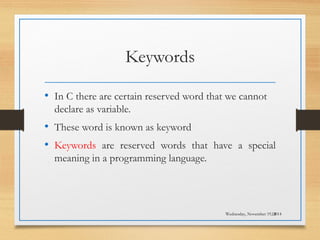
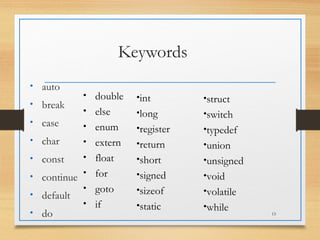


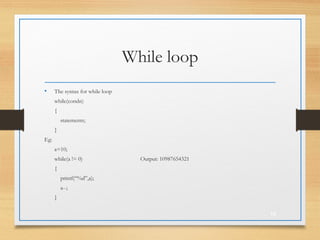
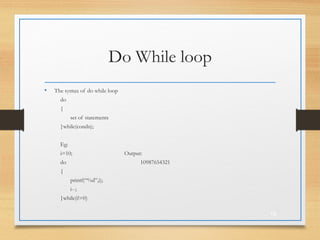








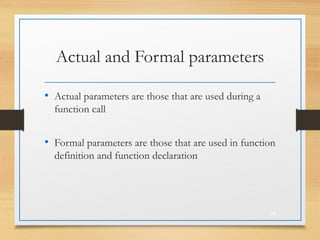

![Arrays
• Array index starts with zero
• The last index in an array is num – 1 where num is the
no of elements in a array
• int a[5] is an array that stores 5 integers
• a[0] is the first element where as a[4] is the fifth element
• We can also have arrays with more than one dimension
• float a[5][5] is a two dimensional array. It can store 5x5
= 25 floating point numbers
• The bounds are a[0][0] to a[4][4] 30](https://image.slidesharecdn.com/cprogramming-141119064704-conversion-gate02/85/C-programming-30-320.jpg)

![Structures
struct Person
{
int id;
char name[5];
}P1;
P1.id = 1;
P1.name = “vasu”;
32](https://image.slidesharecdn.com/cprogramming-141119064704-conversion-gate02/85/C-programming-32-320.jpg)

